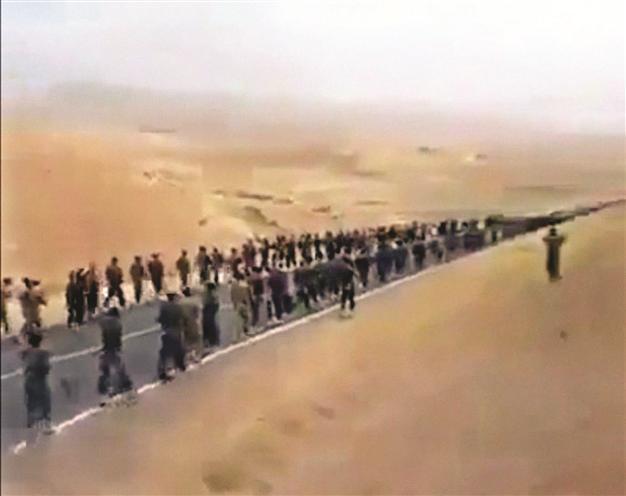Ankara: Assad leaves Turkish border to Kurds
ANKARA - Hürriyet Daily News

This photo grabbed from a video footage shows thousands of Kurds, who completed their ‘training’ in northern Iraq, marching to northern Syria, according to Doğan news agency. Kurdish groups in Syria have mobilized to get the best position in the new era. DHA photo
The Syrian administration has deliberately left the three districts on the Turkish border in northern Syria to the control of the Democratic Union of Kurdistan (PYD), known as an affiliate of the outlawed Kurdistan Workers’ Party (PKK), reliable Turkish sources have claimed. Ankara is concerned that the potential expansion of the Syrian Kurdish-controlled area in northern Syria could establish another front for the PKK in its attacks against Turkey.“We are not concerned about the creation of a new Kurdish state,” said Deputy Prime Minister Beşir Atalay, speaking to reporters after a meeting on the refugee camps for Syrians. Dismissing reports that the control of the entire northern area has passed to Kurdish groups, Atalay said “This is not true. Our foreign minister informed us about it. … There was a minor flag issue in a little town,” he stated, referring to the raising of the PKK’s flag in a small town just across the Turkish border last week.
“Damascus left the region to the PYD both to deploy its troops in the center of the country for its clashes with the Free Syrian Army and to intimidate Turkey,” the sources told the Hürriyet Daily News.
“We are closely following developments, but they only control three districts. The situation should not be presented as if they control all of northern Syria.”
With the escalation of clashes in Syria and the momentum given to the rebel Free Syrian Army (FSA), Kurdish groups in Syria have also begun mobilizing to get the best position in the likely post-al-Assad period. In a meeting with Iraqi Kurdistan Regional Government leader Masoud Barzani, 16 different Kurdish groups have agreed to stand together as part of the Syrian Kurdish National Council.
However, the PYD has gained the control of three towns, including Kobane and Efrin in Aleppo and Amude in the city of al-Hasakah, on the Turkish border. There are also reports that the PYD and Syrian forces were in talks for Qamishli in northern Syria.
“Of course, we will closely monitor whether the PYD acts with other Kurdish groups or not,” the sources said, without giving further details. Ankara fears that the deepening instability in Syria could push Syrian Kurds to declare an autonomous region in northern Syria on the Turkish border.
As part of the Turkish military’s measures taken on the Syrian border, new troops have been transferred to the frontier from Nusaybin, a district of Şanlıurfa, in 200 civilian vehicles, Doğan news agency reported yesterday. The military had already deployed some surface-to-air missiles on the border after Turkey changed its rules of engagement after its jet was downed by Syria on June 22.
Barzani effect
In related news, thousands of Syrian Kurdish soldiers trained by Barzani’s forces in northern Iraq crossed the Syrian border yesterday, a day after the Iraqi Kurdish leader confirmed for the first time the presence of a training camp in the Kurdish region of Iraq, in an interview with Al-Jazeera.
“A good number of the young Kurds who fled have been trained. We do not want to interfere directly in the situation, but they have been trained,” he said. These soldiers were intended to be deployed in northern Syria to fill any “security vacuum” when the Syrian security forces retreat, he added.
Barzani said the fighting force, made up largely of Syrian Kurds who deserted the army and made their way across the border, would take its orders from a new high committee, formed two weeks ago when two major Kurdish opposition groups put aside their differences.
SNC reassures Ankara
Ankara’s concerns about the Kurdish mobilization were addressed during the July 23 meeting between Turkish Foreign Minister Ahmet Davutoğlu and Abdulbasid Seyda, head of the Syrian National Council (SNC).
Seyda, himself a Kurd, said the Kurdish groups were on the side of the revolution. “The Syrian regime has handed over the region to the PKK or the PYD. The Kurdish people are not on the side of these two groups, but on the side of the revolution,” he said in a statement after his talks with Davutoğlu. After being told that the PKK had raised its flag in the cities it controls, Seyda said that no flag other than that of the SNC was permitted to be raised. He said the Kurds were a natural part of the Syrian people and that the Kurdish problem could only be solved within the territorial integrity of their country.
Victory should not turn into chaos
Turkey’s concerns with regard to Syria are not limited to the Kurds. As the end of al-Assad is looming, it is time to consider plans for a healthy political transition in Syria, officials said. “The victory of the Syrian people should not turn into chaos. We have to think over two processes from now on. The first one is the transition period immediately after the toppling of the regime, which will be followed by the political transition period,” they said.
The victory of the opponents of the regime should not pave the way for future disagreements between different ethnic and religious groups, and the political transition process should be designed in such as way as to not to revive old sectarian disputes. Instead, the transition should embrace all groups and should give political ground to each and every group to form their own political party and run in the elections, the Turkish officials said.
















